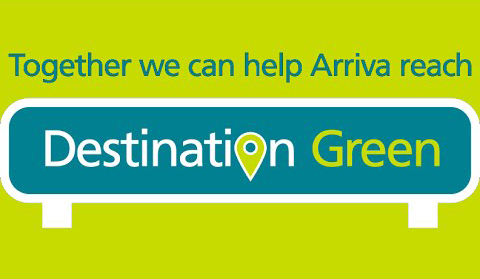
With the Paris Climate Change Conference underway, Arriva plc, one of Europe’s leading bus and rail operators, has announced ambitious plans to reduce carbon emissions, conserve energy and invest in renewable sources, reduce water consumption and recycle more waste.
Arriva’s announcement comes as more than 190 nations gather in the French capital for the two-week summit to seek agreement on an international deal to tackle climate change, with carbon emission cuts at the heart of the debate.
Ahead of a potential Paris deal and in an industry-leading effort, Arriva is aiming to reduce its annual direct carbon emissions by 30% by 2020*.
As part of the 30% goal, Arriva plans to further invest in ‘greening’ its fleet. It already operates electric and hybrid buses across Europe and is actively investing in new technologies to reduce carbon emissions in existing vehicles, including the Econospeed throttle control system for buses and driver advisory systems for trains. In partnership with DriveNow and BMW, in September it also launched the world's largest fully electric city car scheme in Copenhagen.
The carbon emissions goal forms a key part of Arriva’s ‘Destination Green’ programme, which sets out their environmental ambitions as well as informing employees on how they can reduce their environmental impact with simple steps, such as avoiding unnecessary engine idling, braking gently, turning off equipment, and recycling waste.
In addition to cutting carbon emissions, Destination Green sets out a number of other goals that the company is aiming to achieve by 2020*. These include:
- a 30% reduction in annual building energy consumption;
- a 30% reduction in annual water consumption;
- a 30% share of electricity used being renewable, and
- no more than 30% of waste going to landfill.
Each of the pledges is matched with practical steps that the company and its employees must take for in order for them to be realised by 2020. Employees are invited to make a personal fuel, energy, water or waste pledge, for instance looking out for water leaks, placing waste in the correct bins, or making sure equipment is switched off to ensure the company maximises its achievements.
David Martin, CEO of Arriva, said:
“I am incredibly proud to announce this plan with the Paris conference now underway. With these ambitious goals, we are doing what we can to support the delivery of a binding global climate deal.
“As a public transport provider we are already contributing to a greener society, but with Destination Green we want to go beyond that. Arriva’s goal to reduce direct carbon emissions by 30% presents one of the most ambitious environmental targets ever set in the transport sector.
“Our plan is also unique in that it focusses heavily on our employees. Climate change cannot be tackled in boardrooms. We need everyone across the business to be aware of climate change and what they can personally do to tackle it. Everybody has a unique contribution to make, and even small actions will make a huge difference.
“By investing beyond bus and rail, we also want to encourage a modal shift and thereby a greener society. We want public transport to be the go-to option.”
The goals set out in Destination Green will guide targets and plans in all 14 European countries where Arriva provides services.
About Arriva
Arriva is one of the largest providers of passenger transport in Europe, employing some 55,000 people and delivering more than 2.2 billion passenger journeys every year.
In UK rail, Arriva currently operates CrossCountry, Arriva Trains Wales, Chiltern Railways, London Overground, LOROL, Grand Central, and Tyne & Wear Metro.
Arriva is part of Deutsche Bahn, one of the world’s leading passenger transport and logistics service providers. Headquartered in Sunderland, UK, Arriva is responsible for Deutsche Bahn's regional passenger transport services outside Germany.
About Destination Green
Destination Green is Arriva’s internal programme for staff engagement on the environment. It is guided by a series of ambitious goals that the business will seek to achieve by 2020, including:
- a 30% reduction in annual direct greenhouse gas emissions;
- a 30% reduction in annual building energy consumption;
- a 30% reduction in annual water consumption;a 30% share of electricity used being renewable, and
- no more than 30% of waste going to landfill.
*All of the goals will be measured against a 2013 baseline, except the waste goal, for which a 2015 baseline will be used. Carbon emissions will be normaliser per passenger kilometre.




Comments
There are no comments yet for this item
Join the discussion